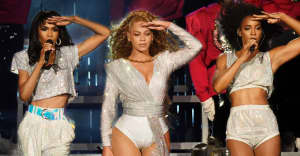It can feel difficult to not speak about Beyoncé hyperbolically but we should try. Not because she isn’t worthy of the praise, but precisely because she is. When she released “Formation” on Saturday afternoon via an unlisted YouTube link, the usual reactions flooded in: Queen! Yaaaaas! Goddess! God! Slay! OMG, look at Blue Ivy! Stills and clips from the video were posted to Instagram and Twitter with quickness, and group chats were alight with all-caps transcriptions of the song’s strongest lyrics and the Melina Matsoukas-directed video’s best bits: here, a line about loving the black anatomy the rest of the world hates; there, a slow-pan across women with big gold hoops and bright hair whom white America would first call tacky and then swiftly swaggerjack.
In the day between the release of “Formation” and her subsequent performance of the song at Super Bowl 50, Beyoncé confirmed that Sasha Fierce, the erstwhile alter-ego that guided her nightly transformation from shy Southern Christian girl to unparalleled global star, is no longer of much use to her. She now has Yoncé, the “Texas ‘bamma” who happily eats carbs and has shed the respectability politics that would once have stifled her from openly talking about the joys of fucking her husband, and possibly taking him to a casual seafood-chain restaurant afterwards. If Sasha Fierce’s glassy-eyed perfection earned Beyoncé the characteristic “robotic” trope for much of her career thus far—she was considered too polished, too guarded, too separate from the material she sings—Yoncé is the complete opposite: a fallible and emotional mother-wife-boss who is better than the rest of us not because she was born that way, but because she worked that much harder. I see it, I want it/ I stunt, yellowbone it/ I dream it, I work hard/ I grind 'til I own it/ I twirl on them haters. We would do well to remember that.
In sound, “Formation,” produced by Mike WiLL Made-It and co-written by Swae Lee of Rae Sremmurd, is a direct continuation of the ultra-cool, ultra-contemporary aesthetic Beyoncé introduced on BEYONCE, the 2013 album that has informally baptized the act of surprise album releases as “pulling a Beyoncé.” Over a sparse, cold beat that would sound just as right under Future or any Atlanta rapper, Beyoncé is forceful and aggressive, exclaiming and proclaiming in a raspy drawl. Some of her adlibs—sharp barks and yelps—even recall Thug. (For the record, anyone who thinks rap is a new area of experimentation for Beyoncé should consider her star turn in 2001’s made-for-MTV musical Carmen: A Hip Hopera.) On “Formation,” she’s proud of herself and of her heritage, she’s determined, she’s strong, she’s aware of the illuminati conspiracy theory-spewing haters but utterly bored by them. She sounds like she’s having fun, like she’s making music for herself and her friends. It’s hard to imagine that all of the fans who will populate the stadiums at her upcoming Formation tour will know why Beyoncé carries hot sauce in her bag, let alone be able to handle more than a drop of that hot sauce. She doesn’t care.
Beyoncé’s success with “Formation” doesn’t come from the fact that she is publicly claiming a politic, but that she is casually weaving that politic in with the rest of her aesthetic.
There’s a common thread of Beyoncé critique that ascribes whiteness to her, thanks to her so-called conformity to white beauty standards—i.e. an inclination for blonde hair and long-standing, if unfounded, accusations of a nose job and routine skin bleaching—and, thanks to her wealth, which affords her a proximity to whiteness in this god-forsaken capitalist power structure. It’s not uncommon to straight-up see people describe her as white. It’s unclear whether she is, with “Formation,” directly responding to those critiques or disregarding them as irrelevant. It hardly matters.
In the same way that Beyoncé has worked hard at her career, she has also worked hard at becoming a less apolitical, more civically engaged person. On BEYONCE, and in the promo cycle that followed it, she embraced feminism, putting a new vocabulary to ideas she has presumably spent much of her career bumping up against. To understand it better as a concept, she turned, among other things, to YouTube. She did not pretend to be a scholar; she simply felt connected enough to the notion of the “social, political, and economic equality of the sexes” that she committed to wearing feminism as a badge. That approach seems to apply to the political themes and overt black pride present in both “Formation” and in her Super Bowl performance of it—references to post-Katrina New Orleans, to police violence and #BlackLivesMatter, to black economic disenfranchisement, to the 50th anniversary of the forming of the Black Panthers.
Still, Beyoncé’s success with “Formation” doesn’t come from the fact that she is publicly claiming a politic, but that she is casually weaving that politic in with the rest of her aesthetic. As much as “Formation” is the big-budget video of a pop star with a big budget, it’s a beautiful entry point into the interiority of black life in the South. It feels like a reprise—maybe the second in a series—of 2013’s “No Angel,” which featured documentary-style scenes of black life in Houston. “Formation” offers a similar glimpse into New Orleans: scenes of church, of Mardi Gras, of black people just being black, taken from the 2014 documentary “That B.E.A.T.” “I want people to be proud and have love for themselves,” she told Entertainment Tonight on Sunday night. But she didn’t have to, because she did the research, and then she did the work.
